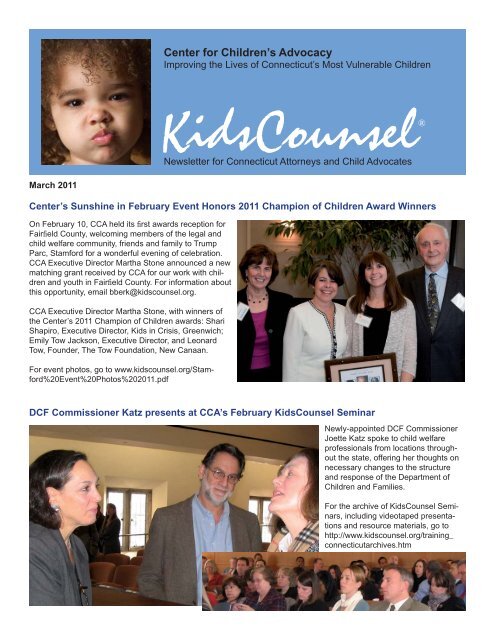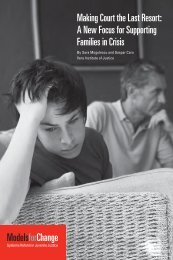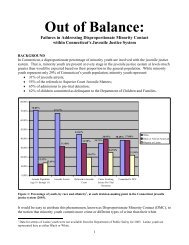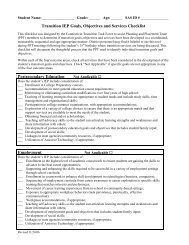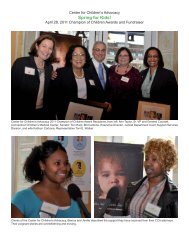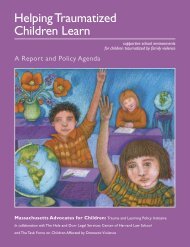March 2011 - Center for Children's Advocacy
March 2011 - Center for Children's Advocacy
March 2011 - Center for Children's Advocacy
Create successful ePaper yourself
Turn your PDF publications into a flip-book with our unique Google optimized e-Paper software.
<strong>March</strong> <strong>2011</strong><br />
<strong>Center</strong>’s Sunshine in February Event Honors <strong>2011</strong> Champion of Children Award Winners<br />
On February 10, CCA held its fi rst awards reception <strong>for</strong><br />
Fairfi eld County, welcoming members of the legal and<br />
child welfare community, friends and family to Trump<br />
Parc, Stam<strong>for</strong>d <strong>for</strong> a wonderful evening of celebration.<br />
CCA Executive Director Martha Stone announced a new<br />
matching grant received by CCA <strong>for</strong> our work with children<br />
and youth in Fairfi eld County. For in<strong>for</strong>mation about<br />
this opportunity, email bberk@kidscounsel.org.<br />
CCA Executive Director Martha Stone, with winners of<br />
the <strong>Center</strong>’s <strong>2011</strong> Champion of Children awards: Shari<br />
Shapiro, Executive Director, Kids in Crisis, Greenwich;<br />
Emily Tow Jackson, Executive Director, and Leonard<br />
Tow, Founder, The Tow Foundation, New Canaan.<br />
For event photos, go to www.kidscounsel.org/Stam<strong>for</strong>d%20Event%20Photos%20<strong>2011</strong>.pdf<br />
<strong>Center</strong> <strong>for</strong> Children’s <strong>Advocacy</strong><br />
Improving the Lives of Connecticut’s Most Vulnerable Children<br />
KidsCounsel®<br />
Newsletter <strong>for</strong> Connecticut Attorneys and Child Advocates<br />
DCF Commissioner Katz presents at CCA’s February KidsCounsel Seminar<br />
Newly-appointed DCF Commissioner<br />
Joette Katz spoke to child welfare<br />
professionals from locations throughout<br />
the state, offering her thoughts on<br />
necessary changes to the structure<br />
and response of the Department of<br />
Children and Families.<br />
For the archive of KidsCounsel Seminars,<br />
including videotaped presentations<br />
and resource materials, go to<br />
http://www.kidscounsel.org/training_<br />
connecticutarchives.htm
CCA Executive Director Named to DCF Transition Team<br />
Commissioner Katz has established a Transition Team to help set and implement her priorities. CCA’s Executive Director,<br />
Martha Stone, was named to the Team in January, shortly after Commissioner Katz took offi ce. Other members of the<br />
Team include Jeanne Milstein, Offi ce of Child Advocate; Steven Grant, Court Support Services Division; Michael Williams,<br />
DCF Area Director; Cathy Holahan, CT Legal Services; Dr. Kenneth Robson, Institute of Living; Raymond Torres, Casey<br />
Family Services; Dr. Galo Rodriguez, Village <strong>for</strong> Families and Children; Dr. Nina Livingston, Ct. Children’s Medical <strong>Center</strong>;<br />
Dr. Darcy Lowell, Child First; Jim Battaglio; Kimberley Fontaine, foster parent; Rev. Bonita Grubbs, Christian Community<br />
Action; Molly Cole, UCHC.<br />
Leo, a seven year old boy, struggles to cope.<br />
Leo is talking about killing himself. His father died this year and at just seven years old, Leo feels<br />
the trouble and sadness that surround his family each day.<br />
Leo’s mother is struggling. She has three young children to care <strong>for</strong> - and she is completely on her<br />
own. Leo’s youngest brother was born with health problems that require frequent medical appointments<br />
and hospitalizations. The middle brother has mental health issues that require his mother’s<br />
constant supervision.<br />
Leo feels alone. His father is gone; his mother often does not have the capacity to devote the time<br />
and attention a young boy needs. He is bullied at school and he cries a lot. He is often not clean and his classmates tease<br />
him. Despite his young age, Leo has been hospitalized <strong>for</strong> depression and mental health issues.<br />
The <strong>Center</strong> <strong>for</strong> Children’s <strong>Advocacy</strong> was appointed by the court to represent Leo when DCF received a report of neglect<br />
from Leo’s school. Recently, Leo was hospitalized again <strong>for</strong> suicidal thoughts. He was about to be discharged and sent<br />
back to his home without adequate community support services in place <strong>for</strong> him or <strong>for</strong> his family.<br />
Connecticut has a long waiting list <strong>for</strong> outpatient mental health services <strong>for</strong> children whose families speak languages other<br />
than English. How would Leo’s depression progress? Who would work with him and talk with him and care <strong>for</strong> him? How<br />
would he get to school and who would look out <strong>for</strong> him when he got there? Who could communicate with Leo’s mother -<br />
whose primary language is Spanish - to help her understand Leo’s needs?<br />
CCA intervened immediately, placing an emergency call to administrators of one of Connecticut’s outpatient mental health<br />
services. The <strong>Center</strong> is <strong>for</strong>tunate to have relationships with the agencies that provide services <strong>for</strong> Connecticut’s most<br />
vulnerable and needy children, and we were able to secure ICAPS (community-based therapy and intervention) with a<br />
Spanish-speaking worker immediately upon Leo’s discharge.<br />
Leo’s family lives near his school, but with two younger children to care <strong>for</strong> his mother can’t walk with him each day. He<br />
is too young and too vulnerable to walk alone. CCA called the Department of Children and Families to help Leo’s mother<br />
secure a bus pass <strong>for</strong> him. When they turned us down, we got a court order to secure the pass.<br />
We worked with the school to have Leo tested, and represented him at a PPT to address his educational needs.<br />
Leo’s life is still hard - but he is doing better. We’re in touch with the family often, keeping up with Leo’s progress and<br />
making sure his mother gets him to appointments. Leo is feeling a little better about school, receiving academic support<br />
services and talking with teachers and school aides when he feels alone and overwhelmed.<br />
The issues that Leo faces are not unique.<br />
There is a shortage of outpatient mental health clinicians who speak languages other than English. Children from families<br />
who speak other languages wait even longer <strong>for</strong> therapeutic support services. The <strong>Center</strong> is advocating with the Department<br />
of Children and Families to resolve this.<br />
CCA’s Executive Director was appointed to the DCF Commissioner’s transition team, and is emphasizing the need <strong>for</strong><br />
attention to issues that are critical to the well-being of Connecticut’s poorest and most vulnerable children. This is a telling<br />
example of the <strong>Center</strong>’s advocacy on behalf of an individual child; this example in<strong>for</strong>ms our systemic advocacy on behalf<br />
of hundreds of children throughout the state.
CCA Introduces Important <strong>2011</strong> Legislation to Protect Connecticut’s Children<br />
Child Welfare<br />
SB 981: Prevent Institutional Placements of Young Children<br />
Connecticut continues to place abused and neglected children under the age of six in group care facilities, despite widespread<br />
agreement that these placements are developmentally harmful to young children. This legislation would prevent placement of<br />
children under age six in group care facilities.<br />
HB 6336: Increase Kinship Care <strong>for</strong> Abused and Neglected Children<br />
Placing an abused or neglected child with relatives can greatly ease the trauma a child suffers when removed from home. Connecticut’s<br />
kinship care rate lags far below the national average. Legislation would require examination of barriers.<br />
HB 6340: Eliminate Placement of Children in Out-of-State Facilities<br />
Each year, Connecticut places hundreds of abused and neglected children in out-of-state institutions. Isolated from family and<br />
friends, these children are segregated from the support of their communities - and cost the state millions of dollars each year.<br />
Homeless Youth<br />
HB 1045: Allow Homeless Youth and Emancipated Minors to Access their Birth Certifi cates<br />
Connecticut law does not allow a minor to get a copy of his/her birth certifi cate without a parent/guardian or attorney. Homeless<br />
or emancipated youth need access to their birth certifi cates to seek employment or necessary benefi ts.<br />
HB 1044: Require Law En<strong>for</strong>cement to Report Youth Arrested <strong>for</strong> Prostitution to DCF<br />
Within 48 hours of leaving home, one in three youth are lured into prostitution (domestic minor sex traffi cking). Law en<strong>for</strong>cement<br />
is the most likely entity to come into contact with these victims and DCF is best suited to provide help.<br />
Sheff<br />
HB 6385: Implementation of Budget Recommendations Concerning Education<br />
Require districts in the Sheff region to accept Open Choice students; provide incentive money to districts who accept these students;<br />
authorize the Commissioner of the State Department of Education to mandate participation by suburban districts.<br />
Health<br />
HB 5959: Prevent Utility Termination <strong>for</strong> Households with a Child Under 24 Months Old<br />
Research shows that very young children are at medical risk if they live in homes without heat. They have higher rates of hospitalization,<br />
more respiratory infections, and increased rates of burns from boiled water used <strong>for</strong> bathing.<br />
Juvenile Justice<br />
HB 6325 and SB 846: Improve Educational Transition <strong>for</strong> Youth Returning from Juvenile Justice Placements<br />
Youth released from the juvenile or criminal justice system face numerous barriers to successful return to school and community.<br />
This legislation addresses the refusal of school districts to promptly enroll students upon their return, and credits students <strong>for</strong><br />
instruction completed while in juvenile justice placements.<br />
HB 5108: Reducing Racial Discrimination in the Juvenile Justice System<br />
Black and Latino youth charged with serious juvenile offenses are almost twice as likely as white youth to be sent to detention,<br />
making them less likely to complete high school, more likely to be unemployed, and more likely <strong>for</strong> future juvenile or criminal<br />
justice involvement..<br />
Reduce School-Based Arrests<br />
CCA is working with legislators and community partners to reduce school-based arrests. This bill would require public reporting<br />
of school-based arrest rates, disaggregated by race and disability status.<br />
HB 6499: Mandate Truancy Filing<br />
Schools often fail to fi le a Family with Service Needs (FWSN) petition until a student has many more absences than those required<br />
to defi ne a student as truant. By mandating that schools fi le within 30 days, truant students will benefi t from more immediate<br />
access to services.<br />
For status and more in<strong>for</strong>mation on pending legislation, go to http://www.kidscounsel.org/legislative_state_SigPending.htm
Attorney Edwin Colon Joins CCA<br />
Edwin Colon recently<br />
joined the <strong>Center</strong> <strong>for</strong> <strong>Children's</strong><br />
<strong>Advocacy</strong>, working<br />
with CCA's TeamChild<br />
Juvenile Justice Project<br />
and Teen Legal <strong>Advocacy</strong><br />
Clinic.<br />
Attorney Colon advocates<br />
in the Hart<strong>for</strong>d public<br />
schools on behalf of youth<br />
who are involved in the juvenile justice system and<br />
works with CCA's teen legal clients in Fairfi eld County,<br />
helping to resolve legal issues that prevent academic<br />
success.<br />
Prior to joining CCA, Edwin was in private practice. He<br />
holds a JD from University of Connecticut School of<br />
Law, and a MSW from University of Connecticut School<br />
of Social Work. He has worked with the Annie E. Casey<br />
Foundation and Casey Family Services, providing support<br />
<strong>for</strong> individuals and families involved with the foster<br />
care system; and with the Department of Children and<br />
Families as an Investigations and Treatment Social<br />
Worker on child abuse investigations. Attorney Colon<br />
has held faculty positions at the University of Connecticut<br />
School of Social Work and at Capital Community<br />
College, Hart<strong>for</strong>d.<br />
Save the Date<br />
Spring <strong>for</strong> Kids!<br />
<strong>Center</strong> <strong>for</strong> Children’s <strong>Advocacy</strong><br />
Champion of Children Awards<br />
Reception and Silent Auction<br />
April 28<br />
Braza, Hart<strong>for</strong>d<br />
CCA Attorney<br />
Sarah Eagan<br />
named to<br />
Connecticut<br />
Magazine’s<br />
40 Under 40<br />
Sarah Eagan, Director of<br />
the <strong>Center</strong>’s Child Abuse<br />
Project, was named to<br />
Connecticut Magazines’s<br />
40 Under 40 - the next<br />
generation of leaders.<br />
Read more at http://www.<br />
kidscounsel.org/news.htm<br />
Teen Makes Very Generous Donation<br />
to <strong>Center</strong> <strong>for</strong> Children’s <strong>Advocacy</strong><br />
Athena and Alex Loukellis visited with Martha<br />
Stone to make a very generous contribution to<br />
the <strong>Center</strong> <strong>for</strong> Children’s <strong>Advocacy</strong>.<br />
Alex recently celebrated his 16th birthday. He<br />
invited his friends to celebrate with him, but<br />
asked that, rather than gifts, they make a donation<br />
to the <strong>Center</strong>. Alex presented CCA with a<br />
donation of $2000!<br />
Thank you, Alex. You are a hero to the abused<br />
and neglected children we represent each day.
The Educational Rights of English Language Learners<br />
(Limited English Profi cient - LEP)<br />
Written by: Stacey Violante Cote, Esq, MSW<br />
Director, CCA Teen Legal <strong>Advocacy</strong> Clinic; Principal Attorney, Immigrants and Refugees New Arrivals <strong>Advocacy</strong> Project<br />
Access to education <strong>for</strong> English Language Learners (ELLs) is governed by both state and federal law. The protections provided can be<br />
technical and confusing, but they provide a framework <strong>for</strong> aggressive advocacy to assist ELL students.<br />
Connecticut Law<br />
Connecticut has a statutory scheme that recognizes English as the medium of instruction and also allows school districts to establish<br />
a bilingual/bicultural program of study (CGS § 10-17 et seq). Every Board of Education is required to annually report the number of<br />
students whose dominant language is other than English and those who are not profi cient in English (CGS. § 10-17f). These numbers<br />
are used to determine school districts’ responsibilities to ELL students under state law. Here’s how it works:<br />
• Where a school has 20 or more students who are dominant in any one language other than English, the school district is required<br />
to provide native language support (bilingual programming) the following school year (CGS § 10-17f(b)). So, if a school is currently<br />
required to provide native language instruction in Karen (West Middle School, Hart<strong>for</strong>d) or Creole-Haitian (Bassick High School,<br />
Bridgeport), this determination comes from the previous year’s enrollment numbers.<br />
• Bilingual or native language instruction is limited by statute to 30 months (CGS § 10-17f(d)).<br />
• Parents can opt-out of bilingual programming by signing a document at the school (CGS § 10-17f(e)).<br />
• Bilingual programming provides <strong>for</strong> the continuous increase in the use of English and corresponding decrease in the use of the native<br />
language support within each year and annually (CGS § 10-17e(2)).<br />
• If a student does not meet English mastery standard at the end of 30 months, the school district is required to provide language<br />
transition support services (LTSS) to the student. These can include English as a second language programs (which use only English<br />
as the instructional language), sheltered English programs, English immersion programs, tutoring and homework assistance<br />
(CGS § 10-17f(d)).<br />
• Students in bilingual programs must be assessed annually to determine progress made toward meeting English mastery (CGS §<br />
10-17f(c)).<br />
• Connecticut uses the Language Assessment Scales (LAS Links) to determine bilingual students’ progress toward English mastery.<br />
Federal Protections<br />
Title VI of the Civil Rights Act of 1964 prohibits recipients of federal fi nancial assistance from discriminating against or otherwise excluding<br />
individuals on the basis of race, color, or national origin, in any of their activities. Title VI, 42 U.S.C. §2000(d) provides:<br />
No person in the United States shall, on the ground of race, color or national origin be excluded from participation in, be denied the<br />
benefi ts of, or be otherwise subjected to discrimination under any program or activity receiving Federal fi nancial assistance.<br />
The term “program or activity” is broadly defi ned and includes programs and services offered by public schools (42 U.S.C. §2000d-<br />
4a). These provisions have been interpreted to require that school districts ensure that persons with limited-English profi ciency are not<br />
excluded, because of a language barrier, from effective participation in the district’s program and services (Lau v. Nichols, 414 U.S. 563<br />
(1974); Castaneda v. Pickard, 648 F.2d 989 (5th Cir. 1981)).<br />
This obligation includes the duty to provide an effective alternative language program to students not yet able to participate effectively<br />
in the regular instructional program (Castaneda; OCR Memorandum of December 3, 1985). A school district must also ensure that<br />
in<strong>for</strong>mation provided to LEP students is supplied in a language and mode of communication that they understand (Ibid). In a September<br />
1991 memorandum, the then-Assistant Secretary <strong>for</strong> Civil Rights stated that schools have an obligation to comply with “the regulation<br />
implementing Title VI of the Civil Rights Act of 1964 to provide any alternative language programs necessary to ensure that national<br />
origin minority students with limited-English profi ciency (LEP students) have meaningful access to the schools’ programs.”<br />
What does this mean <strong>for</strong> your ELL or LEP clients?<br />
Students in Connecticut whose parents don’t opt out of bilingual programming, and who are in a state mandated bilingual school in their<br />
dominant language, are entitled to 30 months of native language support. It is important to fi nd out what the native language support is<br />
<strong>for</strong> the student and where s/he is in his/her 30 months. Additionally, it is important to get the student’s LAS scores on an annual basis in<br />
order to determine progress in meeting the English mastery standard and to determine what the appropriate<br />
supports might be.<br />
ELL students who are not in a mandated bilingual school are entitled to support in order to have meaningful access to the curriculum,
ut not necessarily native language support. This can take various <strong>for</strong>ms, including ESL classes, curriculum modifi cations, tutoring,<br />
and summer programming. A good resource <strong>for</strong> more in<strong>for</strong>mation about supports <strong>for</strong> ELL students is the <strong>Center</strong> <strong>for</strong> Applied Linguistics<br />
(www.cal.org).<br />
Connecticut Resources<br />
For a list of the schools required to provide bilingual programming, go to http://www.kidscounsel.org/legalresources_teenrights.htm.<br />
In Connecticut, the Department of Education’s ELL/Bilingual Consultant is Marie Salazar Glowski. Her contact in<strong>for</strong>mation, as well as<br />
in<strong>for</strong>mation about educating ELLs, can be found at http://www.sde.ct.gov/sde/cwp/view.asp?a=2618&q=320822.<br />
Federal Resources<br />
The U.S. Department of Education’s Offi ce <strong>for</strong> Civil Rights (OCR) ensures equal access to education through en<strong>for</strong>cement of federal<br />
civil rights laws on behalf of ELL students. In<strong>for</strong>mation about OCR, its compliance reviews of school districts, and Know Your Rights<br />
materials can be found at http://www2.ed.gov/about/offi ces/list/ocr/index.html.<br />
Bridgeport Truancy Court Prevention Project<br />
Written by: Kathryn Meyer, Esq.<br />
Equal Justice Works Fellow, CCA Educational Success Project<br />
Thanks to a partnership between Child and Family Guidance <strong>Center</strong> (<strong>for</strong>merly Greater Bridgeport Child Guidance <strong>Center</strong>), Bridgeport<br />
Public Schools, the Judicial Department, and the <strong>Center</strong> <strong>for</strong> Children’s <strong>Advocacy</strong> (CCA), CCA has started a new truancy court prevention<br />
project (TCPP) at Jettie S. Tisdale School in Bridgeport, CT. The project is modeled after the Hart<strong>for</strong>d TCPP, which is a joint ef<strong>for</strong>t<br />
between CREC, the Village <strong>for</strong> Children and Families, Hart<strong>for</strong>d Public Schools, the Judicial Department, and CCA.<br />
The TCPP intervenes with students who are at risk of being faced with a Families with Service Needs (FWSN) petition in Juvenile<br />
Court, based on their truant behavior. In Bridgeport, Child and Family Guidance provides a volunteer case manager, Javier Soegaard,<br />
who monitors the students’ attendance and academic achievement, while also connecting students to pro-social extracurricular and<br />
community activities. CCA provides legal advocacy to help students become more successful at school and at home: <strong>for</strong> example, a<br />
student may be truant because of bullying at school, special education issues, or problems with a guardian at home. Judge Carol Wolven,<br />
from Bridgeport Juvenile Court, conducts bimonthly “court sessions” at the school to monitor students’ progress on various goals.<br />
These sessions provide a measure of <strong>for</strong>mality to the process (though they are not legally binding), and at the same time, allow the<br />
judge to interact with students who are in need of her mentoring and guidance, hopefully preventing the need <strong>for</strong> them to appear be<strong>for</strong>e<br />
her on the bench.<br />
During the past four months, each student in the Bridgeport TCPP has been set up with an afterschool program that is best suited to<br />
his or her interests and connected with appropriate tutoring programs. We have advocated <strong>for</strong> special education and school discipline<br />
rights within the school setting, and conduct bimonthly court sessions with Judge Wolven. The students are enthusiastic about their<br />
participation, and have developed productive relationships with their case manager and with each other.<br />
TCPP staff plan to take the students to tour a local college campus in the spring to help them set their goals on higher learning. The<br />
students are motivated by incentive trips, and are eager to progress suffi ciently enough to be included.<br />
The administration at Jettie S. Tisdale has been extremely cooperative, providing room space <strong>for</strong> the program, facilitating selection of<br />
students, and offering options <strong>for</strong> activities <strong>for</strong> students after the school day at Tisdale. Case Manager Javier Soegaard, who has been<br />
very successful in his ef<strong>for</strong>ts with the kids, was recently awarded the the City of Bridgeport JFK Legacy Award <strong>for</strong> his dedicated volunteer<br />
work with the TCPP.<br />
We look <strong>for</strong>ward to enrolling more students as these students progress to the “aftercare” program, which involves a lower level of monitoring<br />
after students’ main goals have been achieved.


